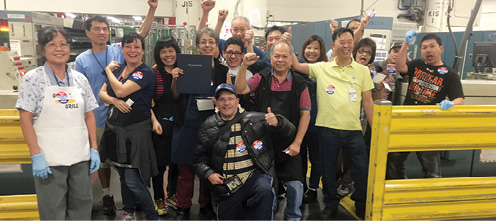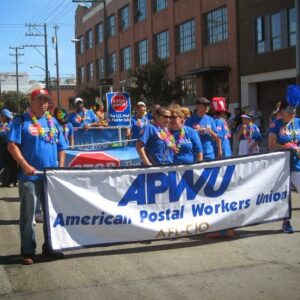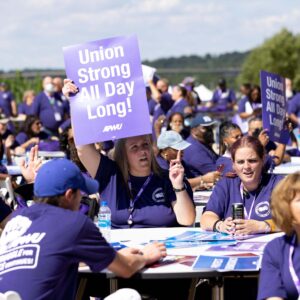May 1, 2016
Contract Arbitration Gets Underway
(This article first appeared in the May-June 2016 issue of The American Postal Worker magazine.)
Interest arbitration hearings for our new contract got underway in February and continued in March and April.
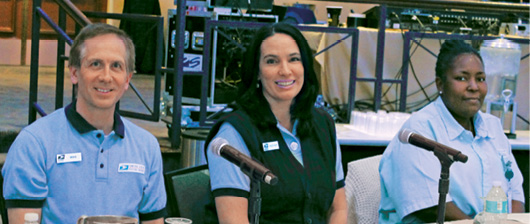
On Feb. 17, the opening day of the hearing, APWU President Mark Dimondstein outlined the union’s case in an impassioned presentation to the board of arbitrators, anchored by Neutral Arbitrator Stephen Goldberg.
A total of 28 Clerk, Maintenance and Motor Vehicle employees – including career employees and Postal Support Employees (PSEs) – gave the arbitrators an understanding of the complexity of their duties, testifying in vivid detail about the work they do, the responsibilities bestowed on them, and their unwavering commitment to serving postal customers.
Economists also presented testimony in support of the union’s proposals for wage increases and an end to the multi-tier workforce structure.
‘Justly Compensated’
The interests of the 200,000 postal workers represented by the APWU are contained in the preamble of the APWU Constitution, Dimondstein told the arbitrators: “We believe all members of labor have the right to economic, political and social justice.
“We carry out our mission frequently short-staffed, under stress, and all too often in the environment of management decisions – such as processing facility closings, reduction in retail hours, subcontracting and service standard reductions – that undermine our work and service to the people of this country,” he said.
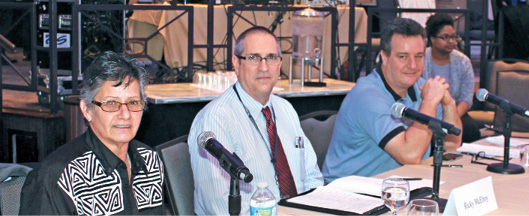
“Postal workers earn the right to be justly compensated for our service and hard work,” Dimondstein declared. “The economic lot of workers should be constantly improving, and those improvements should be passed on from generation to generation. We earn the right to be provided a safe workplace, free of harassment and discrimination, and, after concluding our careers, to enjoy a secure and dignified retirement.”
He urged the arbitration board to “justly compensate” postal workers and take the opportunity to promote a vision of a Postal Service that will be vibrant for generations to come. “The union proposals do both,” he said.
(To read the full text of Dimondstein’s speech, visit www.apwu.org. A hard-copy booklet of the speech can also be obtained from your state or local president.)
Workers Speak Out
Nineteen career Clerk, Maintenance and Motor Vehicle Service employees testified on Feb. 18 and 19. (See page 18, 20, 22.)
Several themes emerged:
- Working for the Postal Service is different from other jobs that may sound similar. (That’s important because the panel of arbitrators will rule on pay, among other things.)
- Postal employees enjoy a tremendous degree of trust from the public.
- They work independently, in many cases with minimal supervision.
- Experience is crucial. It enables postal workers to make important decisions that impact service and protect postal revenue.
- Postal work is hard work.
- Employees take great pride in doing their jobs well and are dedicated to serving the people of the country.
Craft Directors Clint Burelson (Clerk), Steve Raymer (Maintenance) and Michael O. Foster (MVS) introduced the craft panels and gave context to the workers’ testimony.
On March 10, nine Postal Support Employees (PSEs) from the Clerk, Maintenance and Motor Vehicle Service Crafts offered emotional testimony, telling compelling stories about the devastating effect low wages have on every aspect of their lives. (See page 26.)
Dimondstein praised the employees’ testimony, saying, “They spoke eloquently for all postal workers.”
Economic Proposals
The union presented a series of witnesses who supported the APWU’s monetary package. Union economist Kathryn Kobe testified on March 8, reviewing a series of graphs and charts illustrating the current state of the workforce and substantiating the union’s proposals for wage increases, retaining cost-of-living allowances (COLAs), and other monetary matters. Economic conditions have changed significantly since the previous contract was negotiated, she pointed out.
Other union experts demonstrated that APWU members’ wages are comparable to the wages of employees in large, unionized private-sector workforces.
On March 9, a union attorney dissected the problems caused by multi-tiered workforces, and Jennifer Kelly, director of research at the United Auto Workers union, outlined the detrimental effects multiple pay and benefit structures have had on employee morale in the auto industry.
The union and management have agreed that the new contract should have a three-year term, which would run from May 21, 2015, when the last contract expired, through May 20, 2018.
Hearings resumed in April, as this magazine went to press.
A Shout Out for Solidarity
The United Auto Workers showed real labor solidarity when Director of Research Jennifer Kelly testified about the negative effect multi-tier workforces have had on career and non-career workers in the auto industry.
“Please accept the thanks and appreciation of the American Postal Workers Union for the assistance you and the UAW rendered to our union by donating the time and talent of Jennifer Kelly to testify before the Interest Arbitration panel that will adjudicate our new contract,” President Mark Dimondstein wrote to UAW President Dennis Williams after the testimony. “Ms. Kelly could not have been more impressive as a witness. She was knowledgeable, prepared, and thorough,” he wrote.
“She testified to the success UAW has had in fighting back against two-tier wage agreements that were imposed during the Great Recession, especially in the recent Big Three bargaining. Her testimony made the point that union workers, both old and new, are eager to claw back those two-tier provisions and are willing to strike to do so.”
Sticker Day Solidarity
Members across the country showed solidarity on the first day of arbitration hearings by wearing “Opening Day – Fighting for Justice” stickers on the workroom floor. Visit flickr.com/apwunational for more photos.
